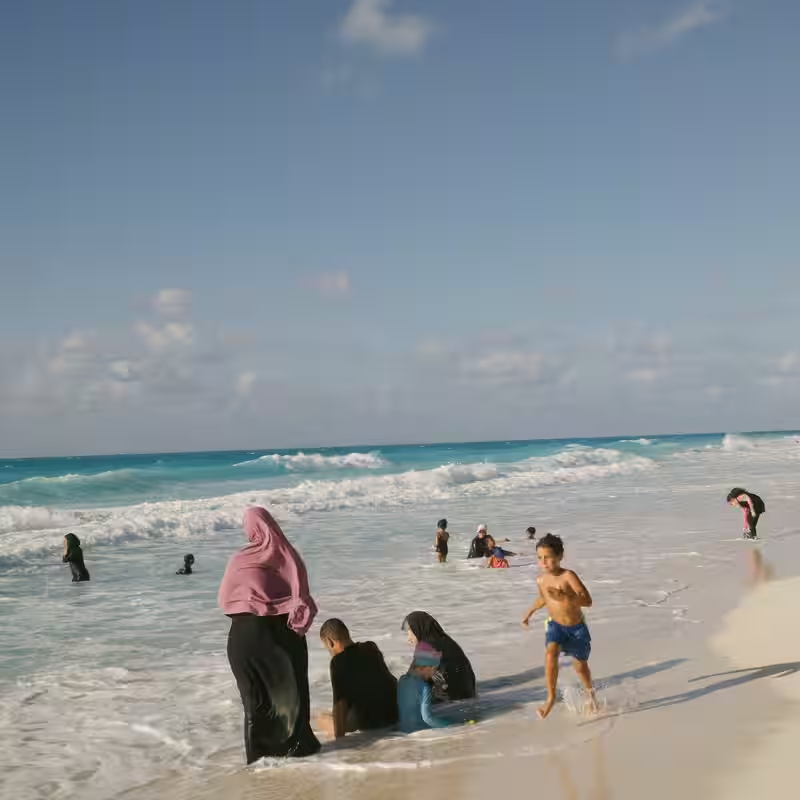Table of Contents
- Good Sahel vs Evil Sahel: What’s the Difference?
- The Beach Divide That Mirrors Egypt’s Class Split
- QR Codes, Gated Access, and the Price of Privacy
- Culture Clash or Class War?
- Not So Black and White
- Sources
Good Sahel vs Evil Sahel: What’s the Difference?
Along Egypt’s Mediterranean coast, just an hour’s drive apart, lie two beach communities that look nearly identical—but couldn’t be more different in spirit. Welcome to Good Sahel (Sahel el-Tayeb) and Evil Sahel (Sahel el-Shireer)—nicknames locals use without irony.
Both boast turquoise waves, powdery white sand, and summer sun. But where Good Sahel offers burkinis, plastic chairs, and clams sold by beach hawkers for a few Egyptian pounds, Evil Sahel serves frozen margaritas, designer swimwear, and DJ sets by global stars like Peggy Gou—all behind gated compounds with QR-code entry.
The Beach Divide That Mirrors Egypt’s Class Split
This coastal contrast isn’t just about vacation styles—it’s a microcosm of Egypt’s deepening social and economic divides. As the country grapples with inflation and a shrinking middle class, the gulf between those who can afford Evil Sahel’s $6,000-a-week villas and those who haven’t taken a beach trip in years has never been starker.
“It’s ‘evil’ because they spend a lot of money,” says 83-year-old Mohieddin el-Ashmawy, a retired naval officer who’s summered in Good Sahel for decades. “With every step there, money talks.”
QR Codes, Gated Access, and the Price of Privacy
Once, beachgoers could invite friends to their summer homes along the coast. Now, developments like Almaza Bay and Marassi—Evil Sahel’s trendiest enclaves—require digital QR codes for entry, issued only to property owners or renters. These codes have become so coveted they’re being resold online, sparking controversy and even a TikTok trend.
“It’s like a border, seriously,” says Dalia el-Ghoneimy, visiting Almaza for the first time. “The beach shouldn’t be like this. The beach is for everyone.”
Culture Clash or Class War?
For many affluent Egyptians, Evil Sahel isn’t about excess—it’s about freedom. In a conservative society where public displays of Western-style leisure can draw criticism, these gated communities offer a rare space to wear bikinis, play loud music, or sip cocktails without judgment.
“You want to be able to relax and have your kids running around,” explains Sherif Seif, a marketing executive hosting his son’s birthday party in Almaza. “It’s a private compound with private residences.”
Yet critics argue this “freedom” comes at the cost of exclusion. Billboards for these developments—written in English, featuring unveiled women—speak directly to Egypt’s elite, often ignoring the country’s broader cultural and economic reality.
Not So Black and White
Despite the labels, the line between Good and Evil Sahel isn’t absolute. Some women in burkinis swim in Evil Sahel; some unveiled sunbathers prefer Good Sahel’s simplicity. One morning in Almaza, a man in religious garb walked the beach with Quranic verses playing from his phone—met not with outrage, but quiet acceptance.
“That’s why I have a problem with ‘Evil Sahel, Good Sahel,’” says Seif. “Because it’s all about you and what you do.” He takes a sip of vodka and smiles.




